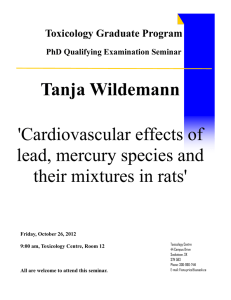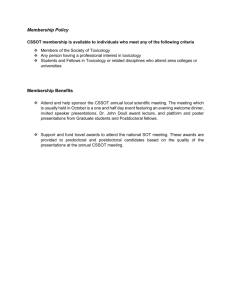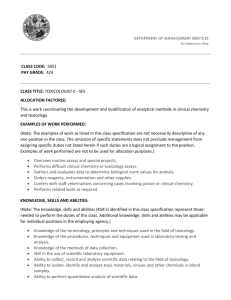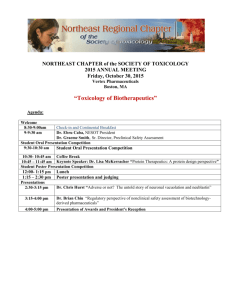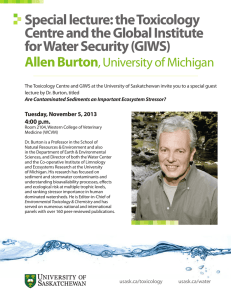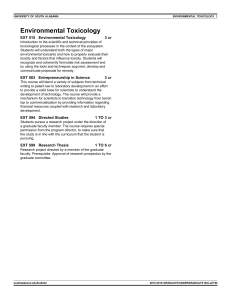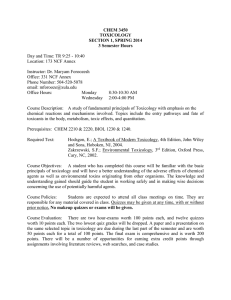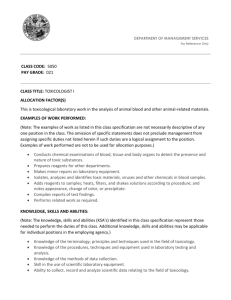Document 14301014
advertisement
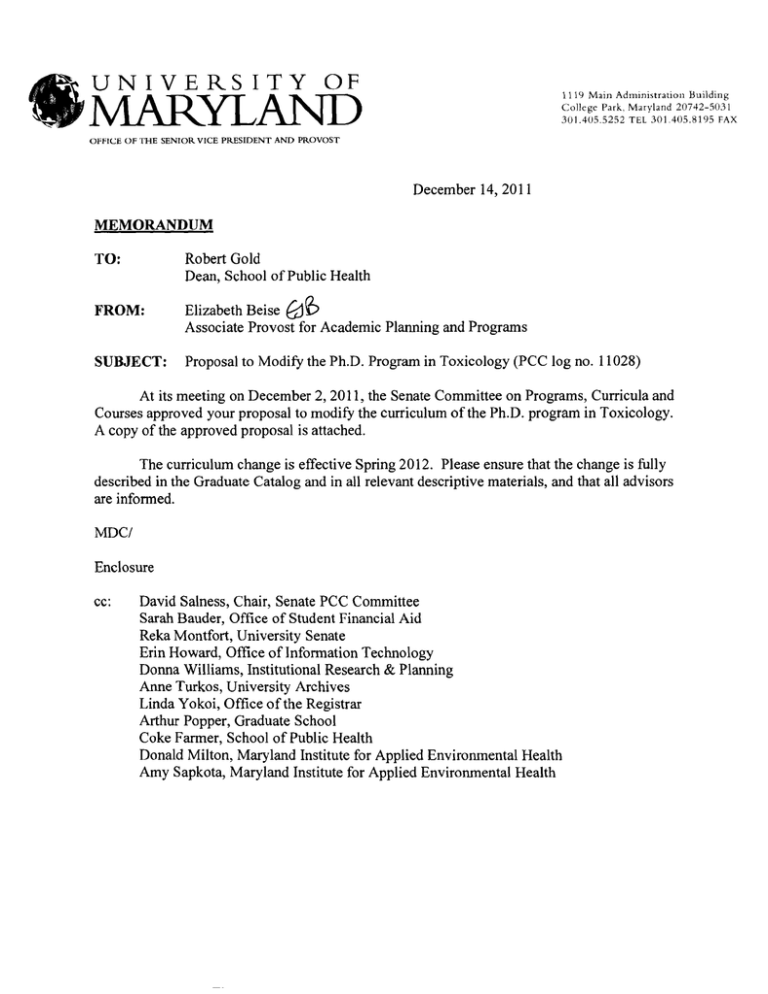
UNIVERSITY OF
_
1119 Main Administration Building
College Park, Maryland 20742-5031
301.405.5252 TEL 301.405.8195 FAX
. MARYLAND
OFFICE OF THE SENIOR VICE PRESIDENT AND PROVOST
December 14, 2011
MEMORANDUM
TO:
Robert Gold
Dean, School of Public Health
FROM:
Elizabeth Beise tj ~
Associate Provost for Academic Planning and Programs
SUBJECT: Proposal to Modify the Ph.D. Program in Toxicology (PCC log no. 11028)
At its meeting on December 2, 2011, the Senate Committee on Programs, Curricula and
Courses approved your proposal to modify the curriculum of the Ph.D. program in Toxicology.
A copy of the approved proposal is attached.
The curriculum change is effective Spring 2012. Please ensure that the change is fully
described in the Graduate Catalog and in all relevant descriptive materials, and that all advisors
are infonned.
MDC/
Enclosure
cc:
David Salness, Chair, Senate pce Committee
Sarah Bauder, Office of Student Financial Aid
Reka Montfort, University Senate
Erin Howard, Office of lnfonnation Technology
Donna Williams, Institutional Research & Planning
Anne Turkos, University Archives
Linda Yokoi, Office of the Registrar
Arthur Popper, Graduate School
Coke Fanner, School of Public Health
Donald Milton, Maryland Institute for Applied Environmental Health
Amy Sapkota, Maryland Institute for Applied Environmental Health
THE UNIVERSITY OF MARYLAND, COLLEGE PARK
PROGRAM/CURRICULUMIUNIT PROPOSAL
•
to
Please
em~il th.e rest of the proposal as an MSWord attachment
!PCC LOG NO.
pcc-submlsslons(a'\Imd.~du.
•
.
11 028
Please submit the signed form to the Office of the Associate Provost - - - - - - - - - - - - - - - - - - - ­
for Academic Planning and Programs, 1119 Main Administration Building, Campus.
College/School:
Please also add College/School Unit Code-First 8 digits: 01203300
Unit Codes can be found at: hftps://hvpprod.umdedu/Html Reporfs/unifs.htl1l
DepartmentlProgram: Maryland Institute for Applied Environmental Health (1331701)
Please also add Department/Program Unit Code-Last 7 digits:
Type of Action (choose one):
-v Curriculum change (including informal specializations)
o Renaming ofprogram or formal Area ofConcentration
oAddition/deletion offormal Area ofConcentration
o Suspend/delete program
0 New academic degree/award program
0 New Professional Studies award iteration
0 New Minor
0 Other
Italics indicate that the proposed program action must be presented to the full University Senate for consideration.
Summary of Proposed Action:
The policies for implementing the Toxicology PhD program on the UMCP campus are not specified in the current
Graduate Catalog and need updating following the move of the degree from CLFS/CMNS to SPHL. The prior degree
program was not aligned with CEPH criteria for accreditation of the School of Public Health. This proposal updates the
curriculum bringing it into line with the current UM System Program in Toxicology policy and procedures and building
on the strengths of the Maryland Institute for Applied Environmental Health in implementing the existing Toxicology and
Environmental Health track of the UMS Program on the UMCP campus.
==============================================================~=====================
APPROVAL SIGNATURES - Please print name, sign, and date. f!se additional lines for multi-unit programs.
2. Department Chair
3. College/School PCC Chai
4. Dean
5. Dean of the Graduate School (if required)
6. Chair,SenatePCC
~4ft~
/)/)~
<---t7;:::::;;;>
~
7. University Senate Chair (if required)
8. Senior Vice President and Provost
J2/J3/IJf----_
,
I
._ _~~
r&rM ~~_----I-t~~---+lu.;~{(
_
­
Curriculum Change Proposals
1. Background
The University of Maryland Graduate Program in Toxicology was authorized by the Board of
Regents in 1984 to provide a multidisciplinary training and research program within the
University of Maryland System. Established as an intercampus University of Maryland (UM)
program, the Program in Toxicology encompasses faculty and resources at the University of
Maryland Baltimore, College Park, Baltimore County, Eastern Shore, and Center for
Environmental Studies' Chesapeake Biological laboratory campuses. The inclusion of the
research programs, faculty and resources of these institutions into one graduate program forms
one of the most comprehensive Toxicology Programs in the nation. As an inter-institutional
effort, the program has developed thematic strengths in mechanistic toxicology/ceil injury,
neurotoxicology, aquatic toxicology, forensic toxicology, and molecular epidemiology and
analytical toxicology. The program currently has two tracks: Molecular & Mechanistic
Toxicology; and Toxicology and Environmental Health. The Toxicology and Environmental Health
track includes four focus areas: Environmental Epidemiology and Toxicology; Forensic and
Analytical Toxicology; Aquatic Toxicology; and Risk Assessment and Environmental law.
Students in the Aquatic Toxicology focus are largely based at the Chesapeake Biological
laboratory while students in the other focus areas are mostly based in Baltimore. The University
of Maryland Baltimore has been the lead institution in the Toxicology Program for the 20 years
of its existence.
Participation in the program by UMCP faculty and students has primarily been from the (former)
College of Chemical and life Sciences, and primarily by Prof. Amy Brown and Prof. Judd Nelson
from the department of Entomology. However, for the last 10 years, their students have
typically chosen to enroll in the PhD in Marine, Estuarine and Environmental Sciences as this
program reflects the ecosystem focus of much of their work.
The Maryland Institute of Applied Environmental Health (MIAEH) was established in 2006 with a
mission to carry out research on a broad range of environmental factors and their effects on
human health. Faculty members in MIAEH collaborate with state, federal, international and
private agencies to develop research solutions that address pressing environmental and
occupational health problems. MIAEH currently offers students flexible and individualized
programs of study that lead to the Master of Public Health in Environmental Health Sciences.
Faculty in MIAEH are currently funded by the National Institute for Environmental Health
Science, other NIH institutes, and the Centers for Disease Control and Prevention. Thus, the
research of Public Health faculty within MIAEH is well-aligned with the goals of the Toxicology
program and focused on Environmental Health Science, rather than on ecosystem health and
environmental science that: are the foci of the graduate programs in Environmental Science and
Technology and the system program in Marine, Estuarine and Environmental Sciences currently
offered by other colleges, AGNR and CMNS, respectively. Therefore, because MIAEH would be a
natural home for students interested in pursuing doctoral research in environmental health
science, the Dean of CMNS (in consultation with department chairs from the former ClFS) and
the Dean of SPHl requested that the Toxicology program be reassigned within UMCP to the
School of Public Health. At its May 6, 2011 meeting the Senate Committee on Programs,
Curricula and Courses approved the proposal to move the PhD program in Toxicology to the
School of Public Health effective Fall 2011 (PCC log no. 10049).
Following transfer of the program, MIAEH faculty worked with UMB program director Katherine
Squibb to develop a detailed curriculum to implement the "Toxicology and Environmental
Health" track, for students on the UMCP campus. Students in this track on the UMCP campus
will be offered graduate training in applied areas of toxicology, with a focus on the translation of
basic knowledge of chemical metabolism and mechanisms of cellular toxicity and carcinogenicity
to diseases in human populations. Students will become experts in exposure assessment,
identification of susceptible populations and the role of risk assessment in developing
environmental health policy and regulations. They will also obtain a broad appreciation of public
health as required for students graduating from a School of Public Health accredited by the
Council on Education in Public Health.
This proposal seeks to establish the Maryland Graduate Program in Toxicology's existing track
for Toxicology and Environmental Health at UMCP with a focus on human health, environmental
epidemiology, risk assessment, and environmental justice consistent with the areas of expertise
of the MIAEH faculty. This proposal does not preclude future participation of other faculty on
the UMCP campus who may want to develop additional focus areas within the toxicology
program, e.g. Ecosystem Health or Aquatic TOXicology. However, the TOXicology PhD on the
UMCP campus will remain distinct from the environment related PhDs offered by AGNR and
CMNS, and the Toxicology Program degrees offered on other USM campuses by its requirement
that all graduates have a background in all five core disciplines of public health.
In section 2 we present under the title "Old Requirements", a description of the program from
the 2004 self study (no curriculum details specific to the UMCP campus were available in the
catalog or other administrative files at the time of this writing). The old requirements are
presumably similar to those in place when the last UMCP students participated in the program
over 10 years ago. In section 3 we present under the title "New Requirements" a revision of the
old requirements that is consistent with current System Graduate Program in TOXicology
requirements and procedures for the qualifying examination, and appropriate to the Toxicology
and Environmental Health track.
2.
Old Requirements
From the University of Maryland System-Wide Program in TOXicology Graduate Program Review
Self Study, April 2004:
Toxicologv Program Reguirements
Specific program requirements for the Non-Thesis MS degrees in toxicology include a minimum
of 30 course credits (meeting the course requirements outlined below), successful completion of
a written comprehensive exam, and a scholarly paper written under the direction of the
student's chosen advisor.
Program requirements for the Thesis MS degree in toxicology include a minimum of 30 course
credits (meeting the course requirements outlined below), 6 credits of MS dissertation research,
and a thesis defense.
Program requirements for a PhD degree in toxicology include course work established by the
student's examining committee, successful completion of a written comprehensive exam, oral
defense of a written dissertation research proposal, 12 credits of PhD dissertation research and a
final dissertation defense.
Core Course Curriculum
The toxicology course curriculum is designed to provide an essential core of knowledge in
toxicology, together with elective courses that offer students the background needed to
specialize. All students are required to take a minimum of 12 credits in toxicology, 2 laboratory
rotations, 2 credits of toxicology seminar, 3 credits in biostatistics, 1 credit in scientific ethics and
6 credits in two of the following four areas: analytical chemistry, pharmacology, pathology and
epidemiology. Attendance at Toxicology Seminars is required even if students are not enrolled
for credit. Students may take advantage of courses offered on any of the campuses of the
University of Maryland, as long as they take the indicated number of hours of credit from courses
offered in each subject area.
Students are able to customize their selection of courses and lab rotations based on their specific
career objectives. Final approval of a student's coursework is given by the student's examining
committee when the student is admitted to candidacy.
PhD Comprehensive Examination and Admission to Candidacy Requirements
As early as the end of a student's third semester, but no later than the end of their third
year in the program, a student must pass written and oral qualifying examinations. The
student's examining committee for their comprehensive exams must consist of five members,
three of which must be fun graduate faculty from within the University System of Maryland. The
student's written exam is prepared by his/her examining committee. Each faculty member
submits questions for the one-day exam. Upon successful completion of the written exam, the
student is required to prepare a written thesis proposal. The oral qualifying exam consists of a
presentation and defense of the student's thesis proposal. A thesis committee, made offive
faculty members including the student thesis research mentor, is formed and assigned the task
of supervising the student's thesis proposal and research. The final dissertation defense
examining committee offive is appointed by the Graduate School.
3.
New Requirements
Toxicoloqy Program Requirements for the Toxicoloqy and Environmental Health Track at UMCP
Admission to the program is generally limited to PhD students. Specific program requirements
for the Non-Thesis MS degrees in toxicology include a minimum of 46 course credits (meeting
the course requirements olJtlined below), successful completion of a written comprehensive
exam at the MS level, and a scholarly paper written under the direction of the student's chosen
advisor.
Program requirements for the Thesis MS degree in toxicology include a minimum of 46 course
credits (meeting the course requirements outlined below), successful completion of a written
comprehensive exam at the MS level, 6 credits of MS thesis research, and a thesis defense.
Program requirements for a PhD degree in toxicology include completing the core curriculum
described below and additional course work established by the student's examining committee,
successful completion of a written comprehensive exam, oral defense of a written research
proposal, a minimum of 12 credits of PhD dissertation research and a final dissertation defense.
Core Course Curriculum
The curriculum for the Toxicology and Environmental Health track is designed to provide an
essential core of knowledge in toxicology and environmental and occupational health, together
with elective courses that offer students the background needed to specialize within this broad
area. Students are requirE~d (except as noted below) to take a minimum of 12 credits in
toxicology and environmental and occupational health, 2 laboratory rotations for 3 credits each,
3 credits of environmental health seminar, 6 credits each to cover the basic courses in
biostatistics and epidemiology, 1 credit in scientific ethics, and 6 credits in two of the following
areas: epidemiology/biostatistics, analytical chemistry, pharmacology,
pathology/immunology/microbiology, or environmental science/ecology/climate. Students
without prior training in physiology are recommended to take mammalian physiology or an
equivalent course before matriculation, or during the first semester. Attendance at
Environmental Health Seminars is required even if students are not enrolled in the seminar class
that semester.
Students without a prior MPH from a CEPH accredited program or school of public health must
demonstrate basic competency in health behavior and health services administration either by
meeting criteria set by the respective faculties at UMSPH, by taking 3 credits each in health
behavior and health services administration as part of the Ph.D. program, or taking an
alternative course designed to cover these topics as designated by the Graduate Public Health
Committee of the School of Public Health. Students may, with approval from their advisor and
committee, count prior course work taken at Maryland or another university as meeting the
basic requirements in epidemiology, biostatistics, and other required areas, but at a minimum
must take courses within the University of Maryland system to meet requirements for 12 credits
of toxicology and environmental and occupational health, two laboratory rotations for 3 credits
each, and 6 credits each in two areas of specialization as described above.
Students may take advantage of courses offered on any of the campuses of the University of
Maryland, as long as they take the indicated number of hours of credit from courses offered in
each subject area.
Students are able to customize their selection of courses and lab rotations based on their
specific career objectives. Students must file with the graduate program director a preliminary
plan of study, signed by their advisor, before registering for their first semester of classes and an
amended plan of study before the end of their second semester. The program of study will
describe how the proposed course work will meet the requirements of the core curriculum. The
MIAEH graduate program committee shall review all programs of study for pre-candidacy
doctoral students on an annual basis to ensure that each student meets program requirements.
The student's examining committee gives final approval of a student's coursework when the
student is admitted to candidacy.
PhD Comprehensive Examination and Admission to Candidacy Requirements
As early as the end of a student's third semester, but no later than the end of their third
year in the program, a student must pass written and oral qualifying examinations. The
student's examining committee for their comprehensive exams must consist of five or six
Graduate Faculty members,. three of whom must be full members of the Graduate Faculty and
one committee member who must have a primary appointment outside of MIAEH. The mentor
and the director of the toxicology graduate program at UMCP will automatically be members of
the committee. The mentor serves as chair.
The format of the qualifying examination will be set in coordination with the University System
of Maryland Program in Toxicology steering committee and may consist of a) written questions
from the examining committee or b) direction of the student to write an NIH R01 format
research proposal on a topic that will not be part of the dissertation research. The oral portion
of the qualifying examination will take place no earlier than 15 days after the written
examination or research proposal is submitted to the committee and will be based on the
content of the written eXellmination or proposal and other questions related to the topic covered
in the core courses and area of the student's specialization. The qualifying examination will be
graded as follows: Pass Ph.D. level, Pass M.S. level, and Fail. The exam may be taken a second
time.
After passing the written and oral qualifying examinations the student will be admitted to
candidacy and the examining committee will serve as the thesis committee. The candidate will
then write a dissertation research proposal in consultation with the committee, submit the
written proposal to the committee at least 2 weeks prior to a scheduled oral defense of the
proposal, and finalize the proposal following the oral defense. During the course of the research,
the candidate will meet with the committee at least once every six months and the
mentor/chair will submit a progress report, signed by all committee members, to the director of
the Toxicology and Environmental Health Track at UMCP following each meeting. The Ph.D.
dissertation shall contain ell minimum of three chapters containing complete papers published or
submitted for publication to peer-reviewed scientific journals prior to the examination, together
with such introductory, summary, and supporting materials as deemed appropriate by the thesis
committee. The procedures for the dissertation defense and examining committee are as
specified in the Graduate S.chool Catalog.
4.
Reasons for Changes
The policies for implementing the Toxicology PhD program on the UMCP campus are not
specified in the current Graduate Catalog and need updating following the move of the degree
from CLFS/CMNS to SPHL. The prior degree program was not aligned with CEPH criteria for
accreditation of the School of Public Health.
5.
Sample Program Plan
A plan of study meeting the requirements of the PhD program could include the following
example. This student is described as focusing on environmental and occupational health
microbiology:
Toxicology and Environmental and
Occupational Health
MIEH720
Toxicology
MIEH740
Risk Assessment
MIEH770
Law & Policy in EH
MIEH771
Exposure Assessment
MIEH773
Biological
Contaminants in the
Env.
MIEHxxx....
Molecular Epidemiology
for Env Health
Subtotal"
Basic Epidemiology and Biostatistics
EPIB610
Epidemiology I
EPIB611
Epidemiology II
EPIB650
Biostatistics I
EPIB651
Biostatics II
3
3
3
3
3
3
18
3
3
3
3
Subtotal
12
Advanced Epidemiology and
Biostatistics
EPIB621
Infectious Disease EPI
MIEHxxx**
Spatial Epidemiology
Subtotal
3
3
6
Advanced EnvironmEmtal
Science/Ecology/Climate
MEES698E
Ecosystem Restoration
MEES608C
Diseases in
Chesapeake Bay
MIEHxxx**
Env Justice
Subtotal*
Other Requirements
EPIB641
Ethics in PH
TOX609
Methods in Toxicology
(laboratory Rotation)
MIEH688
Seminar in EH
HlTH665
Health Behavior
H. Sel'Vice Admin
HlSA601
Subtotal
3
3
3
9
1
6
3
3
3
16
* It is expected that many students will take
more than the minimum number of credits
unless they have highly relevant course
work from a prior masters degree.
** New courses to be offered by recently
recruited MIAEH faculty starting in the
spring and fall semesters of 2012.
The student's program plan could be executed as follows:
Year 1
Fall
EPIB610 Epidemiology I
EPIB650 Biostatistics I
BIOl708N Mammalian Physiology
MIEH773 Biological Contaminants
MIEH688 Seminar in EH
Semester total
3
3
3
3
1
13
Spring
MIEH720 Toxicology
MIEH 771 Exposure Assessment
EPlB611 Epidemiology"
EPIB651 Biostatistics II
MIEH688 Seminar in EH
Semester total
3
3
3
3
1
13
Year 2
Fall
MIEH770 Law&Policy in EH
MIEH740 Risk Assessment
EPIB621 Infectious Disease Epidem.
TOXI609 Methods
EPIB641 Ethics in P.I-!.
Semester total
3
3
3
3
1
13
Spring
MIEHxxx Env Justice
HLTH665 Health Behcwior I
TOXI609 Methods
MIEHxxx Spatial Epidemiology
Semester total
3
3
3
3
12
Year 3
Fall
HLSA601 Health Service Admin.
MEES698E Ecosystem Restora.
MEES608C Diseases in C. Bay
TOXI898
Semester Total
Spring
TOXI899
3
3
3
3
12
6
Year 4-5
Fall
TOXI899
6
Spring
TOXI899
6
6. Prerequisite structure of alii required or optional courses
No change from MPH program
7. Resources
MIAEH has the necessary faculty to teach the necessary courses and advise doctoral candidates.
No new resources are reqUi~sted. Three newly recruited faculty members started tenure-track
appointments in MIAEH as of August 2011. The new faculty members are preparing courses on
the following topics to be offered beginning in 2012: Spatial Epidemiology and Statistics for
Environmental Health, Environmental Justice, and Molecular Epidemiology for Environmental
Health. In addition a courses previously listed but not taught, MIEH 770 Law and Policy in
Environmental Health, will now be offered.
8. List of Deleted Courses
None
9. Toxicology PhD Competencies and Learning Outcomes Assessment
See attached "Competencies, Outcomes, and Assessments".
10. letters from Departments
MEES, BIOl
11. Impact on Current and Tr;ansfer students (if any)
No current students.
PROGRAM IN TOXICOLOGY
GRADUATE PROGRAM IN LIFE SCIENCES
September 9, 2011
Donald K Milton, MD, DrPH
Professor and Director
Maryland Institute for Applied Environmental Health
School of Public Health
University of Maryland
SPH Building 255
College Park, MD 20742-2611
Dear Dr. Milton:
I am pleased to let you know that the UM System Program in Toxicology Steering
Committee has approved your cwTiculum proposal and list of competencies and outcome
assessments for the Toxicology/Environmental Health Track PhD program you are activating in
your School of Public Health. Wl~ look forward to developing collaborative activities with your
faculty and students during the coming year.
Regards,
Katherine S. Squibb, PhD
Co-Director, UM System
Program in Toxicology
URiVCl'Sil¥ of Ma£)'Jand Baltimore' 660 West Redwood Street Howard Hall, Room 134 • Ballimore, Maryland 21201' 410 706-5422·410-706-4425 fa."
School of Medicine
.
Dental School
Graduale School
MEES
MARINE ESTUARINE
ENVIKONMENTAL
SCI ENCES CRADU;\TE PROGRAM
September 22, 2011
Donald K. Milton, MD, DrPH
Professor and Director
Maryland Institute for Applied Environmental Health
School of Public Health
University of Maryland
SPH Building 255
College Park, MD 20742-2611
Dear Dr. Milton:
I am writing to let you know that we here at the University of Maryland, Marine
Estuarine Environmental Sciences (MEES) graduate program support inclusion of MEES
courses the updated curriculum for the UM System Toxicology PhD Program
Environmental Health Track in the School of Public Health's Maryland Institute for
Applied Environmental Health. We look forward to seeing Toxicology PhD students in
our graduate classes and eagerly anticipate future collaborative opportunities with your
faculty and students.
Sincerely,
-~-_.-
Dr. Ken Paynter
MEES Director
University of Maryland, College Park
0105 Cole Student Activities Building, University of Maryland, College Park, MD 20742
301-405-6938 Fax: 301-314-4139 Email: mees@umd"edu www"mees"umd"edu
Amy Rebecca
_
Sap,;,;k~o.;;ta;..
Donald K. Milton
Monday, September 12, 2011 5:17 AM
Amy Rebecca Sapkota
FW: Toxicology PhD, Relevant to BSCI440
From:
Sent:
To:
Subject:
Letter from CMNS supporting the Toxicology Program PhD curriculum proposal.
Don
From: Jeffrey S. Jensen
Sent: Sunday, September 11, 2011 6:06 P!"l
To: Donald K. Milton
Cc: Jeffrey S. Jensen; Gerald S. Wilkinson; Robert L. Infantino
Subject: Re: Toxicology PhD, Relevant to BSCI440
Dear Don,
I have discussed this with the course faculty and the department chair. All support inclusion
of BIOL708N Advanced Topics in Biology: Mammalian Physiology; (3 credits) in the Toxicology
program. Please feel free to include the course as part of your pee proposal.
Best wishes,
Jeff
Dr. Jeffrey S. Jensen
Associate Chair and Director of Undergraduate Studies
Department of Biology
Biology/Psychology Building
University of Maryland
College Park, MD 20742
email: jensen@umd.edu
phone: 301-405-5912
From: "Donald K. Milton" <dmilton@umd.edu>
Date: September 9, 2011 1:20:51 PM EDT
To: "Robert L. Infantino" <rinfanti@umd.edu>, "Gerald S. Wilkinson"
<wilkinso@umd.edu>, "Jeffrey S. Jensen" <jensen@umd.edu>
Cc: Amy Rebecca Sapkota <ars@umd.edu>
Subject: RE: Toxicology PhD
Bob,
Thank you for directing this to the people who need to know and approve. Amy Sapkota
(cc'd) is chair of our Institute PCC committee and is available to discuss the proposal if
there are any questions. I'll be available by email next week and back in the office the
week of the 19th.
Don
1
University of Maryland System, Toxicology PhD University of Maryland School of Public Health Competencies, Outcomes, and Assessments August 2011 1. Synthesize toxicological and environmental health knowledge identifying opportunities to advance the field of toxicology and environmental health. Measure: Successful completion of the qualifying examination Criterion: 100% of graduates will pass the examination. Assessment: A portfolio will be complied for each student in the program and reviewed annually by the graduate program committee to assess the rigor and quality of the examinations and student performance. 2. Develop testable hypotheses that will advance the field toxicology and environmental health. Measure: Successful completion of the qualifying examination, dissertation research proposal, and oral defense of the dissertation proposal Criterion: 100% of graduates will pass the examination, prepare and defend a research proposal. Assessment: A portfolio will be complied for each student in the program and reviewed annually by the graduate program committee to assess the rigor and quality of the research proposals. 3. Design and conduct research studies, analyze data and test hypotheses that advance the science of toxicology and environmental health. Measure: Successful completion of dissertation research and submission of a completed dissertation Criterion: 80% of graduates will submit a dissertation within 5 years and 95% within 6 years of matriculation. Assessment: The time to graduation will be assessed after there are at least six graduates from the program and annually thereafter. 4. Effectively communicate results of research to the scientific community. Measure: Successful publication of research in peer reviewed journals and acceptance of abstracts at scientific conferences. Criterion: 100% of graduates will present research either as posters or podium presentations at scientific meetings, 100% will have submitted three research papers to peer reviewed journals, and 80% will have at least one paper accepted and 50% will have two papers accepted for publication prior to defending their dissertation. Assessment: A portfolio will be complied for each student and reviewed annually by the graduate program committee to assess whether students are being required to submit well prepared manuscripts for publication prior to dissertation defense. 5. Communicate research results in a way that makes new knowledge accessible to policy makers and stakeholders. Measure: News coverage quoting the student scientist, presentations to community groups, government officials, and legislators, lay-­‐language research reports for stakeholders. Criterion: 50% of graduates will appear in news coverage of their research, 80% of graduates will give presentations to stakeholders, and 90% will prepare lay-­‐language reports such as to research participants and interested community groups and others. Assessment: A portfolio will be complied for each student and reviewed annually by the graduate program committee to assess whether communication to the public is actively pursued. 6. Demonstrate commitment to environmental health equity. Measure: Inclusion of women, persons of color (particularly socially disadvantaged minorities), economically disadvantaged, and children in research, where appropriate, and among recipients of communication efforts. Criterion: 50% of graduates will focus their work on environmental justice and/or the impacts of environmental factors on women, persons of color (particularly socially disadvantaged minorities), economically disadvantaged, children, and/or other vulnerable populations, 100% will include economic status, race, and ethnicity as factors when analyzing epidemiologic data from the US and other appropriate categories when analyzing human data from other parts of the world, and 75% will target stakeholder communications to vulnerable communities. Assessment: A portfolio will be complied for each student and reviewed annually by the graduate program committee to assess commitment on the part of students. 7. Demonstrate commitment to engaging impacted communities and populations in applied, action-­‐oriented environmental health research. Measure: to engaging impacted communities and populations in applied, action-­‐oriented environmental health research. Criterion: Participation in training and research activities that use community engagement and outreach approaches such as community-­‐based participatory research or community-­‐university partnerships Criterion: 100% of graduates will learn about CBPR, community-­‐university partnerships, service-­‐learning, or other community engagement and outreach approaches as part of the curriculum. For studies involving state-­‐level environmental health issues and/or differentially burdened, exposed, risk, or health disparity populations in the state of Maryland, 50% of our graduates will apply community engagement approaches or frames such as community-­‐based participatory research as part of question development, study design, analysis, dissemination, and translation of results into interventions, policy, and other activities. Assessment: A portfolio will be complied for each student and reviewed annually by the graduate program committee to assess learning and commitment on the part of students.
